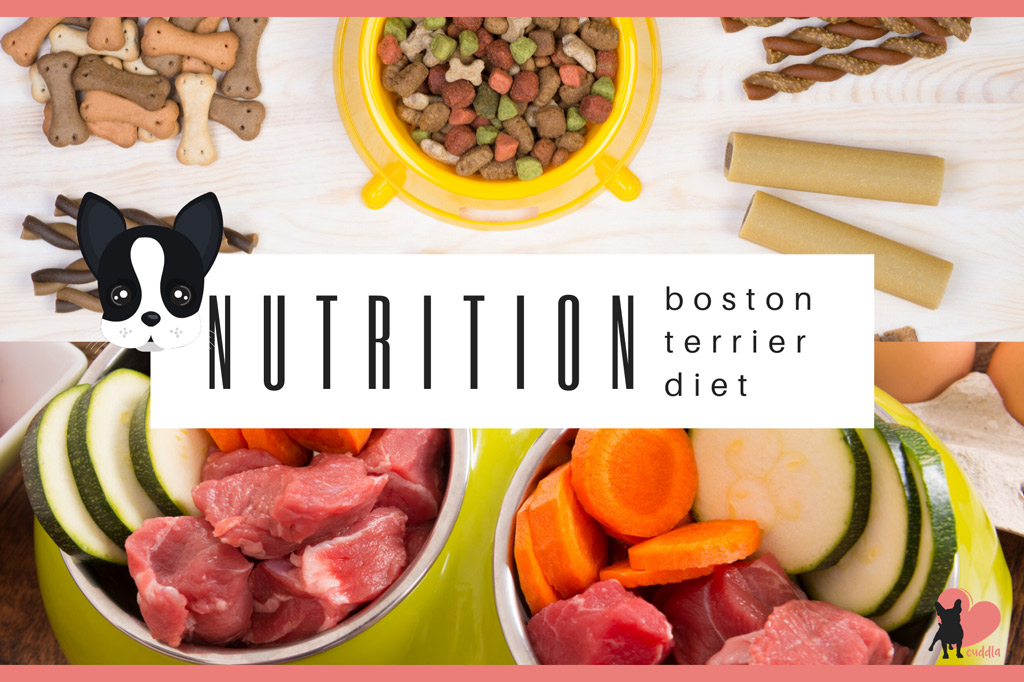
What type of food you give your Boston Terrier has a huge impact on your dog’s health and lifespan.
So, it’s important to feed your Boston Terrier a balanced and species-appropriate diet to avoid:
- Illnesses like diabetes and obesity.
- Problems like flatulence and food allergies.
Let’s see what a Boston Terrier diet looks like. 😉
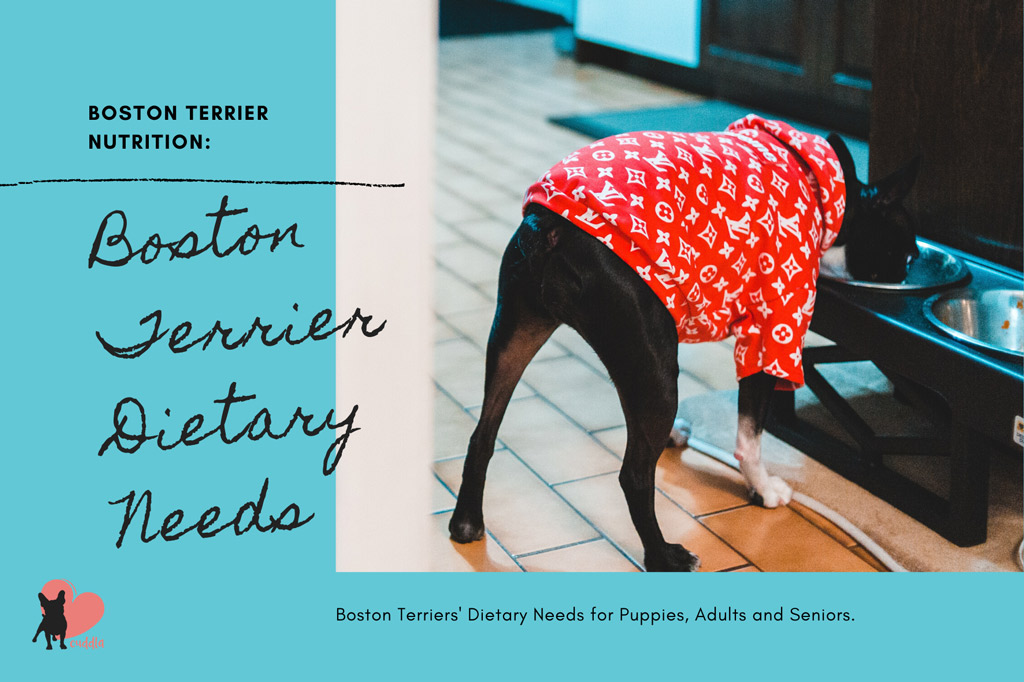
Boston Terriers’ Dietary Needs
What does your Boston Terrier need to eat to thrive, stay healthy and live a long happy life? What are a dog’s dietary needs?
Foods and nutrients are not always synonymous. Some foods contain more nutrients than others.
Before thinking of what type of food to give your pooch, let’s look at what nutrients dogs need in their diet (their dietary needs).
Essential nutrients for Boston Terriers include:
- Proteins.
- Fats.
- Carbohydrates.
- Vitamins.
- Minerals.
- Water.
The nutrients above can be broken down in two categories:
- Macronutrients: These include the basic building blocks of your Boston Terrier’s nutrition. They are the source of energy and calories in dogs. That’s why these nutrients are needed in large quantities.
- Protein.
- Fat.
- Carbohydrate.
- Micronutrients: These nutrients are needed in smaller quantities.
- Vitamins.
- Minerals.
Before I go any further into the subject, here’s a disclaimer:

I am not a veterinarian, so always check with your vet before changing your Boston Terrier’s diet to avoid unexpected consequences.
However, I do have knowledge on dog nutrition and dietary needs.
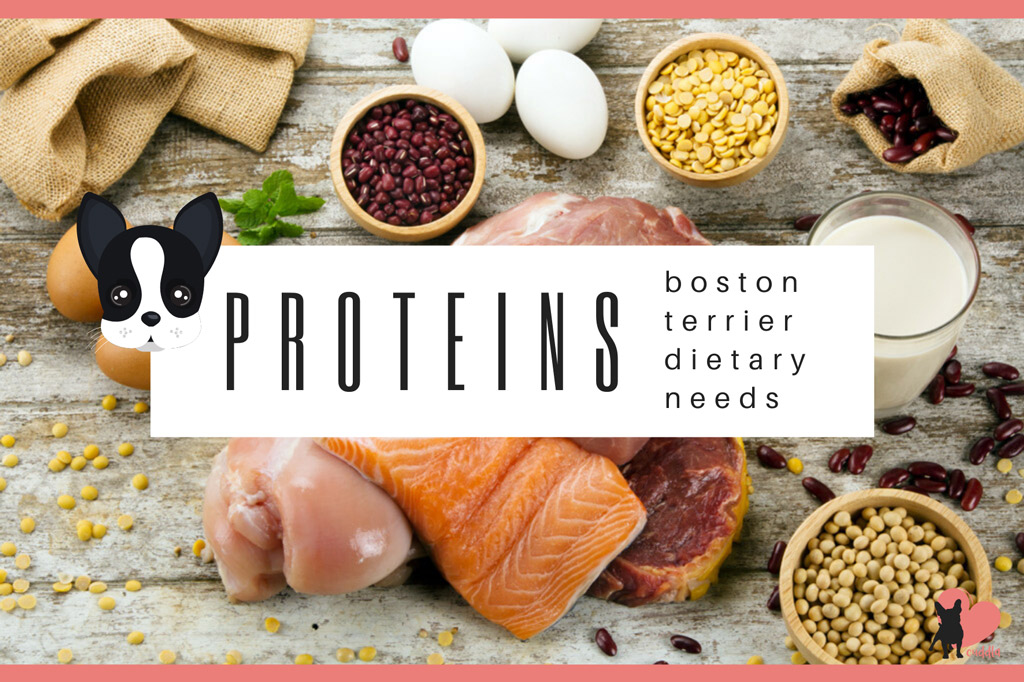
#1 – Proteins for Boston Terriers
Proteins are chains of amino acids held together. These amino acids are essential for all living cells.
Protein Importance
Amino acids play essential roles in the body:
- Collagen and elastin in cartilage, tendons, and ligaments.
- Proteins for muscles.
- Keratin for skin, hair and nails.
- Blood proteins.
- Nitrogen supply.
- Source of energy.
- Make hormones, neurotransmitters, enzymes and antibodies that keep the body functioning optimally.
Note: Growing puppies and pregnant and nursing dams require about twice as much protein as an adult dog.
A diet low in protein causes health problems like:
- Reduced growth rate.
- Low milk production for nursing dams.
- Anorexia.
- Anemia.
- Poor coat.
Essential Proteins for Dogs
Among proteins, there are 10 essential proteins for dogs:
- Arginine.
- Histidine.
- Isoleucine.
- Leucine.
- Lysine.
- Methionine.
- Phenylalanine.
- Serine.
- Threonine.
- Tryptophan.
Protein Sources
Protein is found in high amounts in animal sources and in lesser amounts in plants. Animal sources are the best for dogs since that’s their main natural food source.
Ideally, you will be feeding whole animals or all the parts of an animal when available. These include the meat, organs, bones, skin, head, eyes, feathers, fur and skin.
- Animal sources: Lean-muscle meats, organs, fish and eggs.
- Plant-based sources: Spirulina, some seeds and nuts.
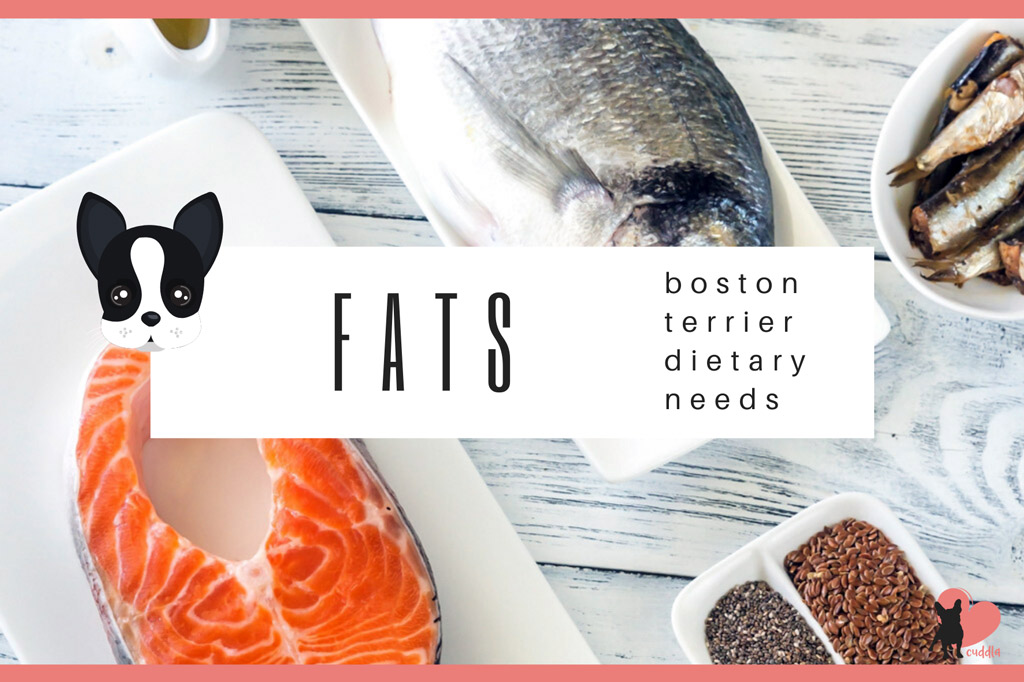
#2 – Fats for Boston Terriers
Fat is a macronutrient made up of fatty acids. Dietary fatty acids are either:
- Saturated (e.g., butter).
- Polyunsaturated (e.g., fish, pork, chicken, and flaxseeds).
- Monounsaturated (e.g., olive oil).
Fat Importance
Fatty acids are essential for the diet since they:
- Are a source of energy.
- Produce friendly bacteria for your dog’s gut, supporting the microbiome.
- Have antibacterial, antifungal and antiparasite properties.
- Contain antioxidant and anti-inflammatory properties.
- Keep your dog’s skin and coat healthy.
- Absorb fat-soluble vitamins.
- Protect internal organs.
- Promote healthy blood flow and muscle activity.
Balancing the omega-3 and omega-6 ratio is essential to prevent diverse concerns. Poor fat balanced diets cause:
- Behavioural problems.
- Hormonal imbalances.
- Heart disease.
- Weight gain.
- Gut issues.
- Insulin resistance.
However, fat is a nutrition thief!
Too much fat cannibalizes proteins, vitamins, and minerals. Plus, it will increase the calorie amount rapidly.
Essential Fats for Dogs
The following polyunsaturated fatty acids (also knows as PUFAs) are essential for dogs:
- Linoleic acid (LA) – a source of Omega-6.
- Alpha-linolenic acid (ALA) – a source of Omega-3.
- Arachiconic acid (AA) – Omega-6*.
- Eicoscipentaenoic acid (EPA) – Omega-3*.
- Docosahexaenoic acid (DHA) – Omega-3*.
*However, dogs are able to manufacture these fats.
Fat Sources
Fats are found in animal and plant sources:
- Animal sources: Low-mercury fish like salmon, mackerel, sardines and anchovies and meat like poultry, pork and beef.
- Poultry is high in PUFAs and LA.
- Pork is high in saturated fats, monosaturated fats and LA.
- Beed is high in saturated fats.
- Eyes and brain are high in DHA.
- Fish is high in PUFAs and ALA.
- Plant-based sources: Coconut oil, phytoplankton, hemp seeds and flaxseeds.
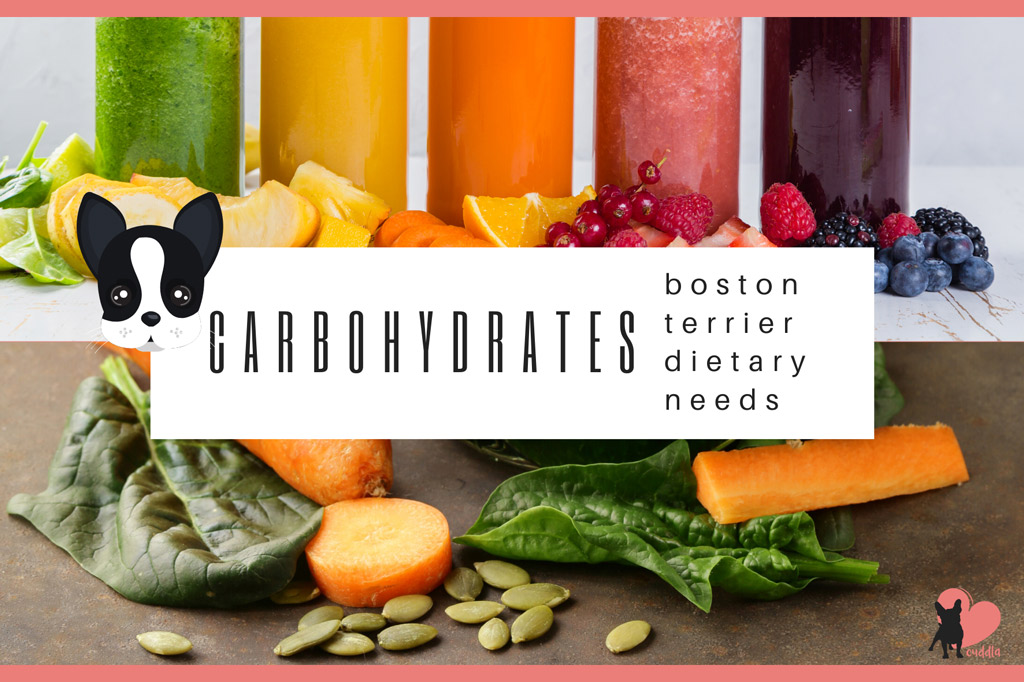
#3 – Carbohydrates for Boston Terriers
Carbohydrate (sugar and starches) have no value on a dog’s diet apart from being used for energy. That’s why they are non-essential.
However, vegetation is a small part of a dog’s primordial diet. Also, by adding the right carbs, it will ensure that your dog is not deficient on vitamins and minerals.
Not all plants are healthy and safe for dogs.
Vegetation high in phytic acid (found in nuts, seeds, legumes, grains, potatoes) and oxalic acid (found in dark leafy greens) interfere with the absorption of nutrients.
Also, starchy vegetables (grains, rice, potatoes, corn, peas, beans, legumes) pose three problems:
- Raise insulin levels (more sugar in the blood).
- Change the pH in your dog’s gut, which impacts the body’s functions and health.
- They are less digestible. Vegetables (4%) and fruits (6-8%) have lower soluble carbohydrate percentage than potatoes (20%) or kibble (30-60%).
Only when choosing those dog safe fruits and vegetables that appear in their primordial diet will your Boston Terrier benefit from:
- Phytonutrients: Chemicals produced in plants that play a role in preventing and treating disease.
- Carotenoids: They act as antioxidants, fighting against free radicals.
- Lycopene: It plays a role in preventing and fighting cancer.
- Lutein: It’s an antioxidant and it’s known to protect eyes, skin and heart.
- Flavonoids: They have antioxidant, anti-inflammatory and anticancer properties.
- Carotenoids: They act as antioxidants, fighting against free radicals.
- Fibre: It has two purposes. The first, it bulks up food, helping it pass through and finally evacuating it as stools. The second, being a prebiotic (food for the beneficial bacteria in the gut).
Carbohydrate Sources
Good carbs that are rich in minerals and vitamins are found in plant-based sources:
- Fruit sources: Blueberries, apples, and bananas.
- Vegetable sources: Carrot, kale, broccoli, spinach, spirulina and seaweed.
- Seeds and nuts sources: Pumpkin seeds, hemp seeds, flaxseeds, and almonds.
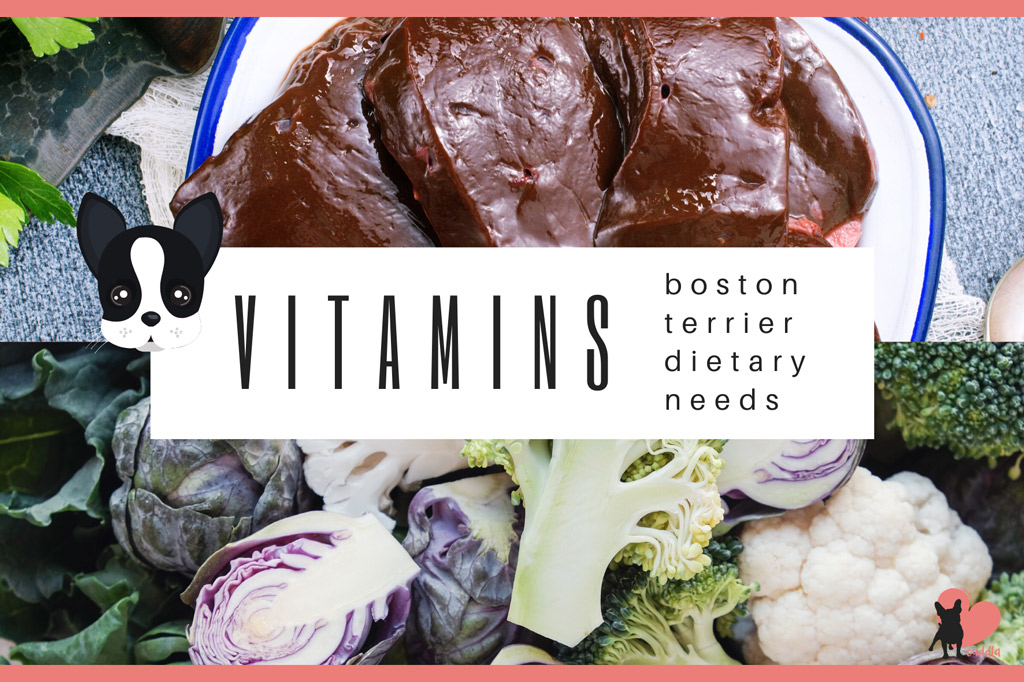
#4 – Vitamins for Boston Terriers
Vitamins are a group of organic compounds (i.e. they contain carbon) found in natural foods.
They are required in small quantities for proper metabolic function, growth, development, maintenance and reproduction.
Vitamins are divided in two categories:
- Water-soluble: Vitamins B and C.
- Fat-soluble: Vitamins A, D, E, and K. They are stored in fatty tissues and the liver.
Vitamin Importance
Vitamins play a variety of critical roles, including:
- Boosting the immune system (Vitamin A).
- Cell protection due to antioxidant function (Vitamins A, B2, C and E).
- Convert food to fuel for energy and protect against behavioural issues (Vitamin B).
- Produce DNA and RNA (Vitamin B11).
- Maintaining nervous system function (Vitamin B12).
- Regulating calcium and phosphorus levels (Vitamin D).
- Enabling the blood to clot (Vitamin K).
If absent from the body, vitamins are the cause of specific deficiency disease. For instance, Vitamin D deficiency in dogs causes rickets, a bone disease that leads to weak, bendy bones.
Vitamin Sources
Vitamins are found in animal and plant sources:
- Animal sources: Cod liver oil, meat organs and glands like liver, kidney, brain, eyes, skin, fur, feathers, etc.
- The liver, in general, is high in vitamins.
- Eggs are also high in vitamin D, Choline (vitamin B4) and Folic Acid (vitamin B), including the eggshells.
- Grass-fed beef liver is high in vitamins D, A and E.
- Cod liver oil is high in Vitamin A.
- Plant-based sources: Broccoli, spinach, pumpkin seeds, nuts and some fruits (blueberries, apples, bananas).
- Brussels sprouts, kale and broccoli are high in vitamin C.
- Almonds are high in vitamin E and Riboflavin (vitamin B2).
- Spirulina, flaxseeds, and hemp seeds are high in Thiamin (vitamin B1).
Note: Dogs don’t need to eat foods high in Vitamin C since they can manufacture it.
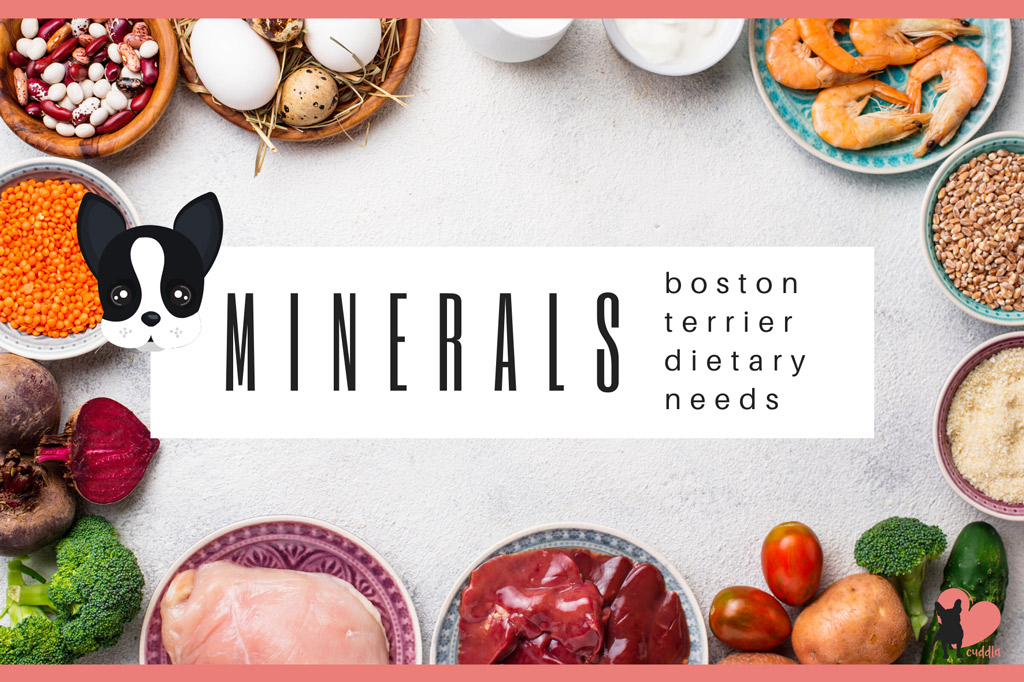
#5 – Minerals for Boston Terriers
Minerals are inorganic compounds that the body needs to maintain proper metabolic functions. The body cannot manufacture minerals; so, it must get them from food.
There are two classes of minerals:
- Macrominerals: These include calcium, chloride, magnesium, phosphorus, potassium, sulphur, and sodium.
- Microminerals: Also known as trace minerals. These include chromium, cobalt, copper, iodine, iron, manganese, selenium, zinc.
Macrominerals are required at higher levels than microminerals, but both types are equally important.
Mineral Importance
Like vitamins, minerals perform a variety of functions in the body that are essential for supporting life, including:
- Constituting a major part of bones (calcium, phosphorus).
- Producing DNA and RNA (phosphorus).
- Regulate minerals and vitamin D (magnesium).
- Carrying oxygen throughout the body (iron).
- Assisting in wound healing (zinc).
- Providing antioxidant support (selenium, zinc).
- Aiding in nerve transmission (sodium, potassium, calcium, magnesium, cobalt).
- Regulating fluid balance (sodium, chloride, potassium).
- Collagen production (sulphur).
- Help with homeostasis, regulating the body’s temperature, fluids and carbon dioxide levels to maintain a stable equilibrium regardless of external changes (potassium).
- Build enzymes and red blood cells (copper).
- Aid in glucose (sugar) regulation and also treats diabetes (chromium).
- Thyroid hormones function (iodine, selenium).
- Activates enzymes and removes nitrogen (manganese)
Note: Growing puppies and pregnant or nursing dams require more calcium than an adult Boston Terrier.
Deficiency in macrominerals is rare. However, deficiency in microminerals can be common in dogs.
Lack of minerals cascades other issues since other compounds need them and therefore are unable to do their jobs.
- Joint pain and arthitis.
- Dull coat and skin issues.
Mineral Sources
Different foods are rich in different minerals:
- Animal sources: The main source of most of the minerals.
- Bones, eggshells and milk are high in calcium.
- Meat is high in phosphorus and selenium.
- Organ meats (especially liver) provide copper, zinc and iron.
- Shellfish is rich in zinc.
- Eggs are rich in sulphur.
- Beef and pork livers are high in copper.
- Liver and kidney are high in cobalt and selenium.
- Fish and eggs are rich in iodine.
- Bone broth is high in magnesium.
- Hair and feathers are high in manganese.
- Plant-based sources:
- Green leafy vegetables are a good source of calcium and chromium. They also contain iron and manganese.
- Hemp seeds, pumpkin seeds and almonds are high in manganese.
- Kale and sesame seeds are high in copper.
- Seaweed, pumpkin seeds and flaxseeds are high in magnesium.
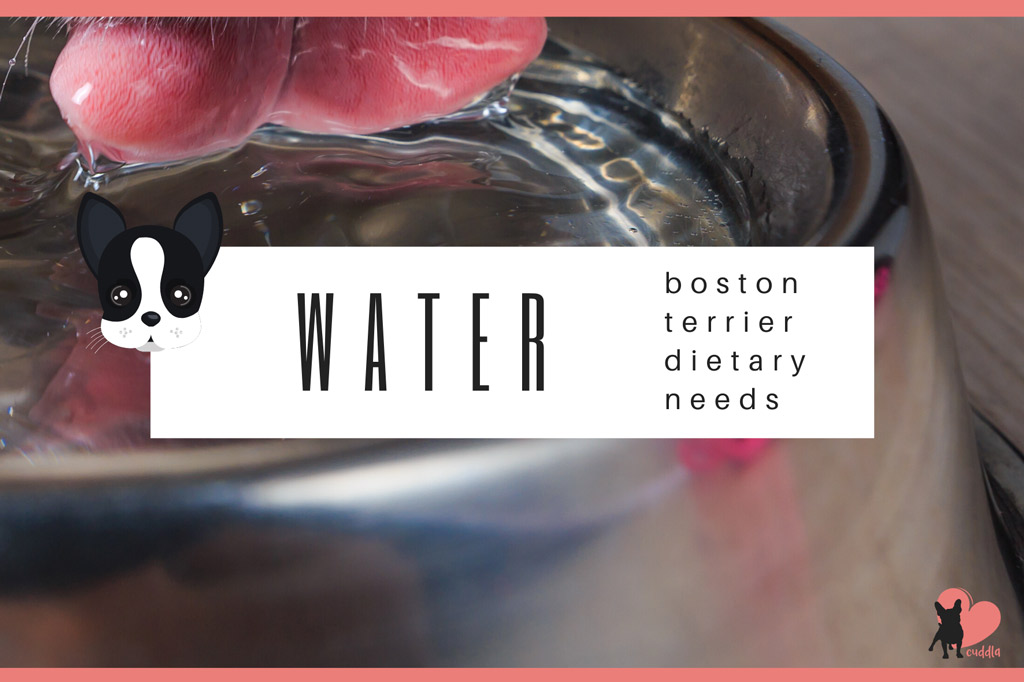
#6 – Water for Boston Terriers
Water is essential for your pooch. Water makes up 70 to 80% of a mature dog’s lean body mass.
Water Importance
Water has many important functions:
- Dissolving and transporting nutrients to the cells.
- Helping regulate body temperature.
- Hydrolyzing protein, fat and carbohydrates for digestion.
- Cushioning the organs and nervous system.
- Flushing waste from the body.
Both water deficiency and excess have severe consequences:
- Drinking too little water can lead to dehydration, kidney stones, organ failure and even death.
- But drinking too much water can lead to stomach bloat, electrolyte imbalances, and hyponatremia (water toxicity).
Water Sources
Make sure your Boston Terrier always has fresh, clean water available.
In many places, water needs to be filtered to guarantee good quality. Tap water high in chlorine and other substances is harmful to dogs and humans.
Boston Terrier Diet
After going through the Boston Terrier’s dietary needs, you’re probably wondering:
How can I make sure that my dog gets all the nutrients needed for a healthy and long life?
The answer is by following a balanced and species-appropriate diet.
But what does this mean?
From a genetic standpoint, domesticated canines (dogs) are essentially the same as their wild counterparts (wolves), who are carnivores. Their DNA sequence only varies about 0.02%.
So nutritionally speaking, dogs are still wolves.
This means that a dog’s primordial (original) diet is essentially that of the wild wolf. Dogs must eat fresh whole animals for optimal health. A whole animal includes all its part: meat, bones, organs, glands, fur, feathers, skin, etc. Every part of an animal provides nutrition, preventing any deficiencies.
However, since our pet dogs don’t hunt for their food, we need to provide to what is closest to wild prey.
Here’s the ladder of progression, starting from the most ideal:
- The Primordial Diet: Ideally, you would feed a whole wild prey to your dog. This provides the right balance of nutrients. -> Very unlikely nowadays.
- The Raw Diet: If nº1 above is not possible, you would feed a whole domestic animal that is grass-fed and grass-finished. Domestic animals have higher levels of fat and lower levels of protein. -> Not achievable for all raw feeders.
- The Frankenprey Diet: If nº2 is not possible, you would feed parts of different domestic animals that are grass-fed and grass-finished. You will have to balance the nutrients yourself. -> A more likely scenario.
- If not, you would feed a whole domestic animal that is grain-fed. This diet has too much fat and not enough vitamins and minerals.
- If not, a fortified commercial raw diet that has synthetic vitamin E. You probably need to add calcium to the diet too.
- If not, a processed commercial “raw” diet. It’s questionable if it’s raw since it has been processed. It has more fat and they are not balanced. Also, it is deficient in vitamins and minerals.
- At the very bottom, you have commercial and processed dog foods like kibble and canned food. It has the wrong balance of nutrients for carnivores. Also, it is deficient in vitamins and minerals.
The closer the diet is to its primordial form (nº1), the fewer deficiencies your pooch is likely to have. However, the further away your dog’s diet is from the primordial diet, the higher the deficiencies. Also, the balance of the nutrients will be completely off.
Before I go through each type of food (refer to Types of Diets for Boston Terriers below), let me explain what is a balanced and species-appropriate diet.
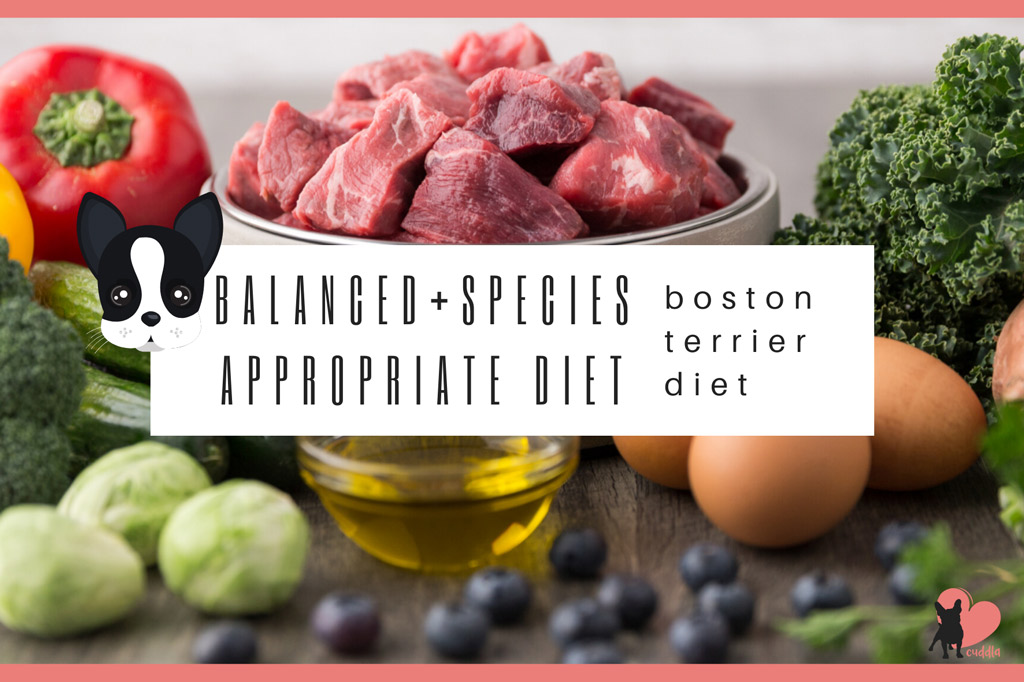
A Balanced and Species-Appropriate Diet
Dog are carnivores and evolved to consume a low-carbohydrate diet.
But for the last century, the majority of dog owners have fed their dogs a high-carbohydrate, low-moisture diet, i.e. kibble.
This processed diet has created significant metabolic and physiologic stress in our dogs. It has even become the root cause of most of the inflammatory processes and degenerative disease we see in veterinary medicine today.
Also, it contributes to cancer development due to their high content in aflatoxins in the ingredients (corn, wheat, rice, nuts, and legumes) and heterocyclic amines due to processing (source).
For Boston Terriers, this means that processed food can be responsible for flatulence, sensitive and food allergies now (and further health problems later on).
A balanced and species-appropriate diet should include:
- High-quality protein.
- Low animal fat.
- A balanced ratio of Omega-3 and Omega-6 fatty acids.
- High moisture content.
- A low amount of vegetation (mimics prey’s stomach contents).
Which also means:
- No fillers like grains, corn, potatoes or other starches that don’t belong to the primordial diet.
- No artificial colouring or preservatives.
- No harmful chemicals.
Boston Terrier Diet for Puppies
When determining the right food quantity for your Boston Terrier, consider the following factors:
- Age.
- Size.
- Metabolism.
- Activity level.
Boston Terriers are small-breed dogs that have a fast metabolism with high energy needs. However, depending on their life stage (puppy, adult or senior dog), they need to consume different food quantity.
When it comes to food for Boston Terrier puppies…
You should also feed your pup a balanced and species-appropriate diet. It doesn’t differ much from an adult dog’s diet in contents or balance.
However, puppies should eat two times more calories than adult dogs. Also, they do need higher amounts of calcium (15% bone). Boston Terrier pups will eat smaller meals more frequently too.
Their energy requirements will peak at 3 to 6 months of age when they are teething. This is when they experience rapid growth and their adult teeth come out.
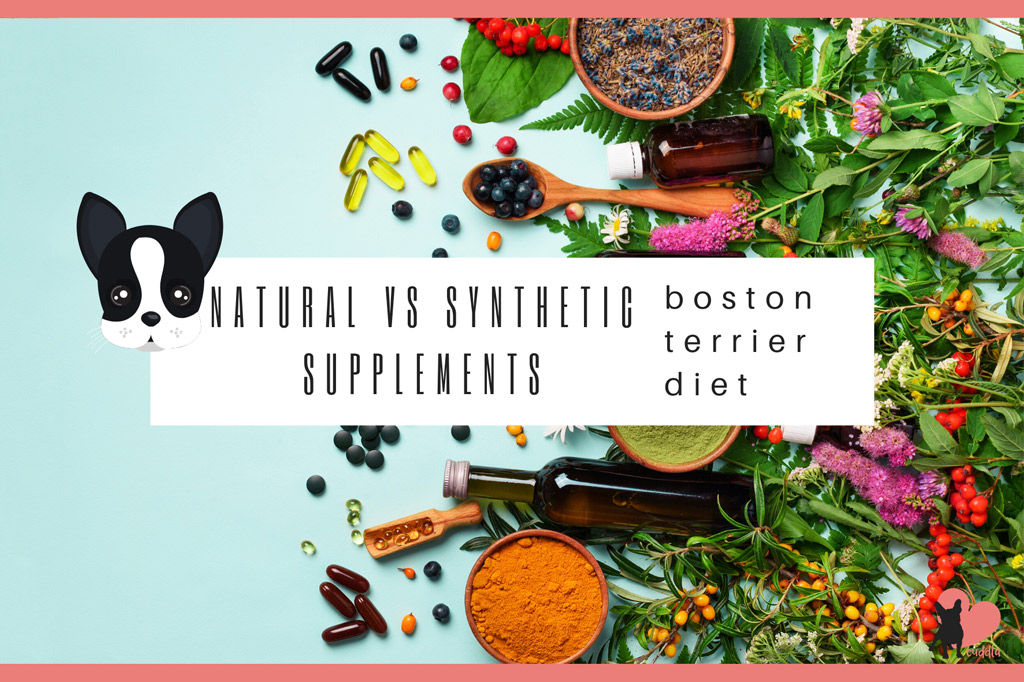
Supplementing a Boston Terrier’s Diet
Depending on what type of diet you go for, your Boston Terrier will have higher or lower deficiencies that you need to compensate for.
It’s always best to fix the nutritional holes with fresh foods rather than supplements.
Naturally occurring vitamins, minerals, and nutraceuticals (omega fatty acids, co-enzyme Q10, enzymes, phytonutrients, probiotics, prebiotics, etc.) are more nourishing than synthetic ones.
Synthetic supplements don’t act like their natural counterparts for two reasons:
- Synthetic vitamins are isolated or fractionated pieces of a whole vitamin.
- They don’t include the dual orientation (left and right) of natural molecules that form vitamins.
Read also: Natural Dog Supplements with Health Benefits You Must Know About.
Types of Diets for Boston Terriers
There are four types of food that you can give your Boston Terrier:
Homemade dog food:
- Raw.
Commercial processed dog food:
- Commercial raw food.
- Dry diet – kibble.
- Moist diet – canned food.
However, not all types of diets are nutritious for your pooch. Remember that dogs should follow a species-appropriate diet.
Let me go through the advantages and disadvantages of each diet, so you can make an informed decision on what you what to feed your Boston Terrier. 🙂
Note: Consult with your veterinarian before making a change in your dog’s diet, especially if your pooch has a health condition.
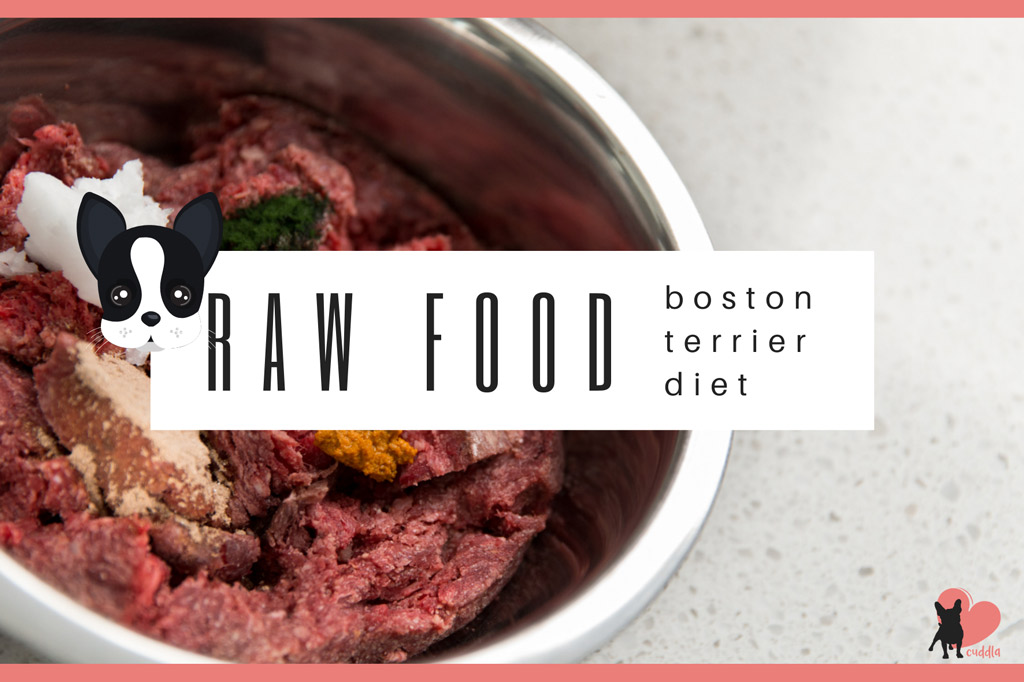
#1 – Boston Terrier Raw Diet
The Raw Diet is also refered to as:
- The Primordial Diet.
- The B.A.R.F Diet (Biologically Appropriate Raw Food).
- The Species-Appropriate Diet.
- The Bones and Raw Food.
You get the idea, right? It’s raw feeding and the goal is to feed dogs the closest to the diet they followed in the wild (The Primordial Diet that wolves still follow).
The macronutrients and micronutrients are balanced in the primordial diet and on the modern raw diet like this:
| Ingredient | % of Calories | Grams/1,000Kcal | % as Fed |
| Protein | 49% | 123g/1,000Kcal | 20% (total 33-40%)* |
| Fat | 44% | 49g/1,000Kcal | 10% |
| Carbohydrate | 6% | 15g/1,000Kcal | 5-10% |
| Bone | 12% (adults) and 15% (puppies) | 12-15% | |
| Organs | 10% (only liver) and 15% (all organs) | 15% |
*Total of proteins includes the proteins found in organs and bones too. The 20% comes from meat and fish.
Advantages
Nutritionally speaking, the raw diet is the richest in nutrition and the diet that dogs have been eating for thousands of years.
- High in protein (33-40%) and the right protein (animal source). The quality improves significantly when the animal is wild or pastured.
- Low amount of fat and balanced (omega-3 and omega-6).
- Protein and fats are balanced (2:1 ratio).
- High in calcium and phosphorus because of the raw bones (12-15%).
- Rich in vitamins and minerals due to the organs (15%).
- Low in carbohydrate (5-10%) but the right ones to supplement vitamins and minerals naturally.
- High in moisture (70%).
Also, from a physiological and anatomical point of view, a dog’s stomach is adapted to consume raw food. A dog’s gut has an acidic pH that is able to digest raw meats and bones, plus extract the nutrition from them.
In conclusion, the raw diet is complete, it has no nutritional concerns.
Disadvantages
- Price concerns: It can be expensive, especially because you are sourcing a variety of animals that are grass-fed and vegetation that is organic.
- Parasite concerns: Wild prey and pork can carry worms (tapeworm and roundworm).
- Solution: You need to freeze the meat for a period of time to eliminate them.
- Bacteria concerns: Salmonella is common in poultry like chicken; grass-fed options are always safer. But remember that the FDA is compliant with 10% of salmonella found in poultry for humans.
- Solution: Washing your hands after handling raw food and washing your dog’s bowl is what you need to do. Also, add apple cider vinegar to kill 80-99% of bacteria in your dog’s meal. Fermented vegetables also help. Finally, dog’s with an acidic gut are equipped to handle pathogenic bacteria.
- Time concerns: Preparing a raw diet takes time. You need to chop all the meats and bones. Then, you need to puree the vegetables and fruits for maximum benefits.
Read also: Boston Terrier Raw Diet blog post – includes how to transition to raw feeding.
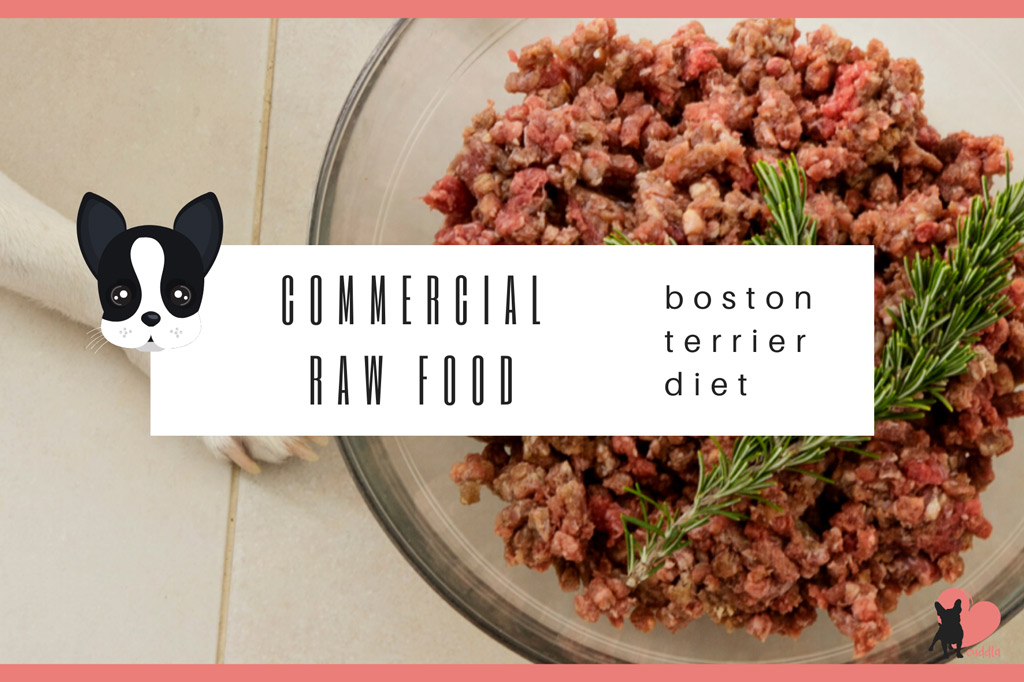
#2 – Boston Terrier Commercial Raw Diet
Commercial raw food for dogs can be a closer looking alternative to the raw diet for your Boston Terrier.
On their “Guaranteed Analysis” you can see the four critical food components (protein, fat, fibre and moisture) percentages. The food should be analyzed on Caloric Basis since it holds moisture and it’s the suitable metric for a high calorie nutrient dense foods like raw diets.
Also, they follow AAFCO‘s requirements. But they don’t apply to raw food since their tests were done on kibble fed dogs.
Advantages
- Still closer to the primordial diet and more natural than processed pet foods like kibble.
- Good source of protein.
- Low carbohydrate content. Both Homemade and commercial raw diets are a good choice for:
- Gassy Boston Terriers and those who suffer from inflammation.
- Boston Terriers with a sensitive stomach and/or food allergies.
Disadvantages
- Nutritional concerns:
- Protein and fat are not balanced. The food has too much fat, the ratio should be 2:1 (twice as much protein than fat).
- Solution: Aim to get close to 2:1 ratio. They have a 1.6:1 ratio in best cases or a 1:1 ratio in the worst.
- Lower in vitamins and minerals.
- Solution: Supplement with vegetables and fruits.
- Protein and fat are not balanced. The food has too much fat, the ratio should be 2:1 (twice as much protein than fat).
- Processing concerns: It stops being raw when manufacturers use HPP (High-Pressure Pasteurization) since they kill the bad and the good bacteria. It also causes nutrient loss.
- Solution: Look for commercial raw food brands that don’t use HPP.
- Price concerns: Still more expensive than kibble and canned food. High-quality protein is always more expensive than the meat residues and other ingredients used in processed pet food like kibble.
Best Raw Diet for Boston Terriers
When choosing a commercial raw diet for your pooch, you should:
- Avoid HPP foods. If a food needs to be sterilized, it’s not high quality. Plus, HPP kills beneficial bacteria and causes nutrient loss.
- Food must be analyzed on a Caloric Basis. Otherwise, you won’t know if the food is deficient or not.
- Watch out for the fat content. You should aim to get the closest you can to a 2:1 ratio. Remember that the more fat, the less protein, vitamins and minerals.
- Avoid added synthetic vitamin and minerals. Synthetic supplements don’t perform like their natural counterparts. It’s best to add vegetation to compensate for deficiencies.
- Stay away from raw foods containing fish oil. The PUFAs in fish oil have the largest carbon bonds, which makes them very easy to oxidize. The food can get rancid when the freezing process punctures those carbon bonds.
Here’s a range of commercial raw food, which is freeze-dried. Brands like Stella & Chewy’s uses grass-fed animals, wild-caught fish and organic veggies and fruits. But they also use HPP.
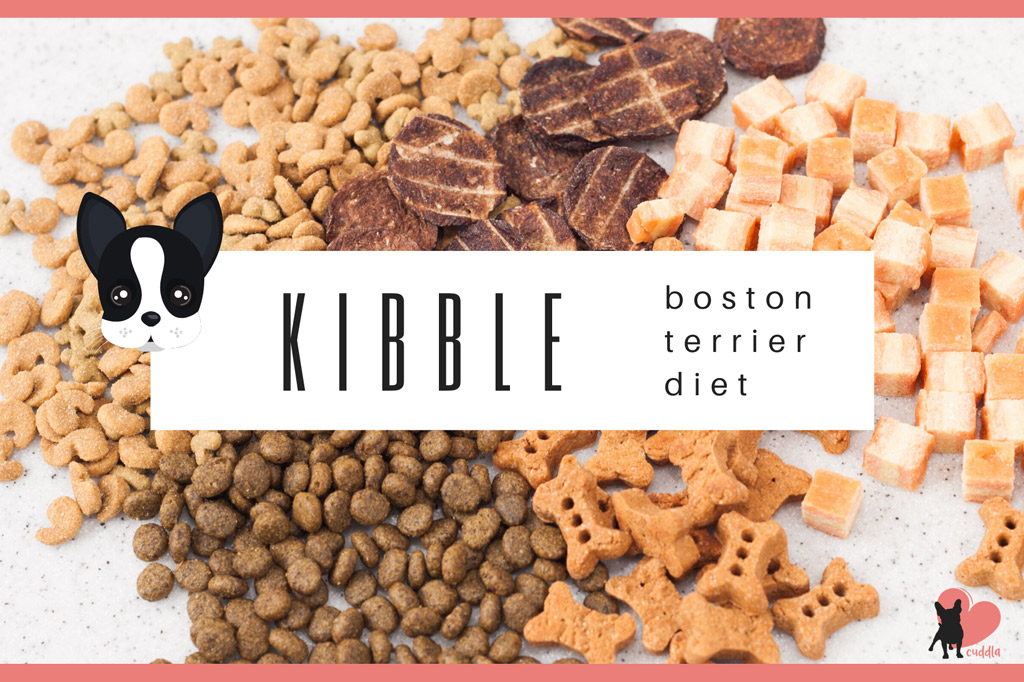
#3 – Boston Terrier Dry Diet (Kibble)
Remember that processed pet food is a new invention that has only been in the market since the 20th century.
Processed dog food manufacturers are focused on grain-based dog diet, even if dogs are carnivorous, not vegetarian.
Advantages
The advantages have to do with price, preservation and commodity, not with nutritional value.
- The most cost-effective food.
- Longer shelve life. It lasts for a longer time and doesn’t need to be refrigerated.
- It’s time-efficient.
Disadvantages
- Processed, not natural.
- High in carbohydrates (30-60%) and not the right ones.
- Corn, grains, soy, rice, potatoes, etc. cause allergies, gassiness and inflammation in dogs. It also contributes to other health problems like chronic degenerative diseases, auto-immune diseases, allergies, kidney, pancreatic and liver disease, and cancer.
- Low in moisture (10%).
- Poor source of protein and fat. It’s made of “Meat Meal” – rendered meat by-products (livestock, seafood, horses and other dead animals).
- Added synthetic vitamins and minerals.
- Added flavouring, colouring and preservatives.
- Have palatability enhancers like yeast, fat, sweeteners (sugar) or concentrated flavours.
On top of these, some pet foods contain harmful ingredients like:
- Unidentified meat or “meals”.
- Propylene glycol.
- 1,2-dihydroxy propane.
- 1,2-propanediol.
- Methyl glycol.
- Trimethyl glycol.
- BHA.
- BHT.
- Ethoxyquin.
And the list goes on!
Basically, anything you don’t identify as food or cannot pronounce should make you pause and reconsider.
Insider Tip: It’s a belief that dry food can also help to keep your dog’s teeth healthy (but raw bones do this too). It’s true that chewing hard food helps to reduce tartar buildup, but the ingredients in dry food might do more harm than good.
Best Dry Diet for Boston Terriers
I highly recommend considering the raw diet for its high nutritional value. However, I understand that kibble could be your only choice. So, let’s make the most out of it!
When choosing kibble for your Boston Terrier, go for:
- Rich in animal protein. Because it should be the primary ingredient in a dog’s diet (regardless if the food is raw or processed).
- Limited ingredients. This is to avoid filers and other harmful ingredients.
- Grain-free. Ideally also starch-free and soy-free. So your Boston Terrier gets quality protein, low carbs and gluten-free food. This will prevent inflammation, allergies and flatulence.
Have a look at the range of dog wholesome food on Amazon.
Read also: Best Diet for Boston Terrier with a Sensitive Stomach and Flatulence.
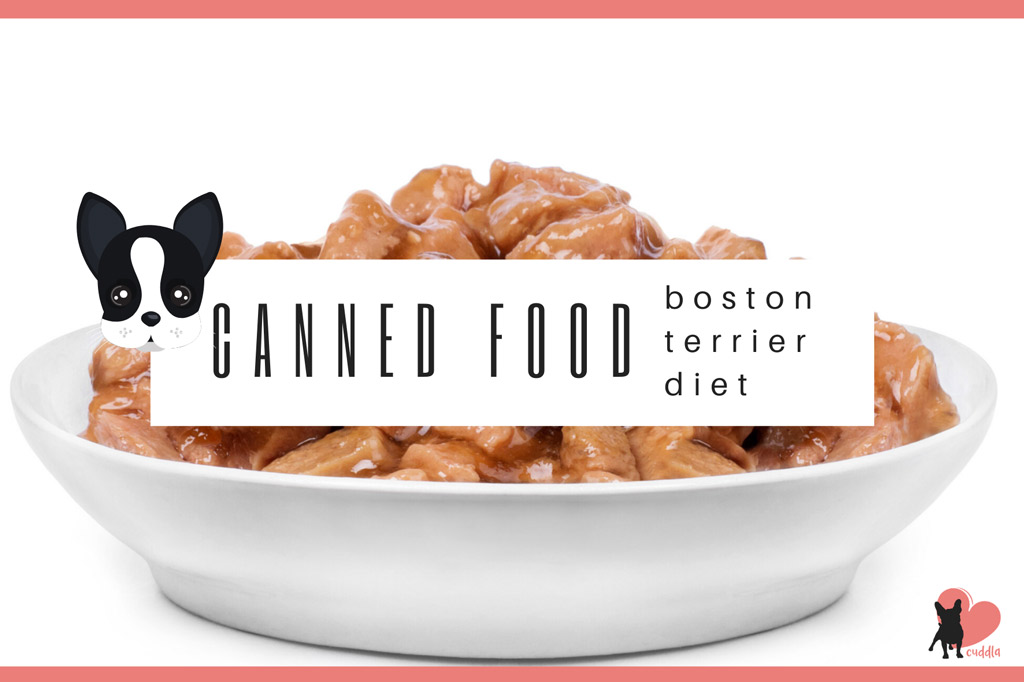
#4 – Boston Terrier Moist Diet (Canned)
Dogs like dry foods only if they are tasty (the higher its palatability enhancers content, the tastier). Generally, they prefer canned food because of the moisture.
Advantages
Again, most of the advantages have to do with price, preservation and commodity, not with nutritional value.
- Still cost-effective food, but more expensive than kibble.
- Longer shelve life. It lasts for a longer time and doesn’t need to be refrigerated.
- It’s time-efficient.
- High in moisture (70-80%).
Many dry foods are soybean, corn and/or rice-based. Canned food is based on beef or chicken along with mineral and vitamin supplements suited for the upkeep of your dog’s health.
Disadvantages
It’s a diet low in nutrients. The cons are similar to the ones in kibble:
- Processed, not natural.
- High in carbohydrates.
- Low-quality protein and fat. It’s rendered meat or protein which might not be digestible for dogs.
- Added synthetic vitamins and minerals.
- Added flavouring, colouring and preservatives.
- Have palatability enhancers like yeast, fat, sweeteners (sugar) or concentrated flavours.
Best Moist Diet for Boston Terriers
When choosing canned food for your Boston Terrier, go for:
- Rich in animal protein. This is a digestible protein.
- Limited ingredients.
- Grain-free. Ideally also starch-free and soy-free.
Here’s a range of canned food for dogs that follows the guidelines above.
Read also: How Much to Feed Boston Terriers? And How Often?
What Boston Terriers Can and Cannot Eat
Can Boston Terriers eat human food?
It depends on the food. There are some human foods that are perfectly safe and even healthy for dogs to eat as an occasional treat.
However, there are others that are harmful and even toxic for dogs!
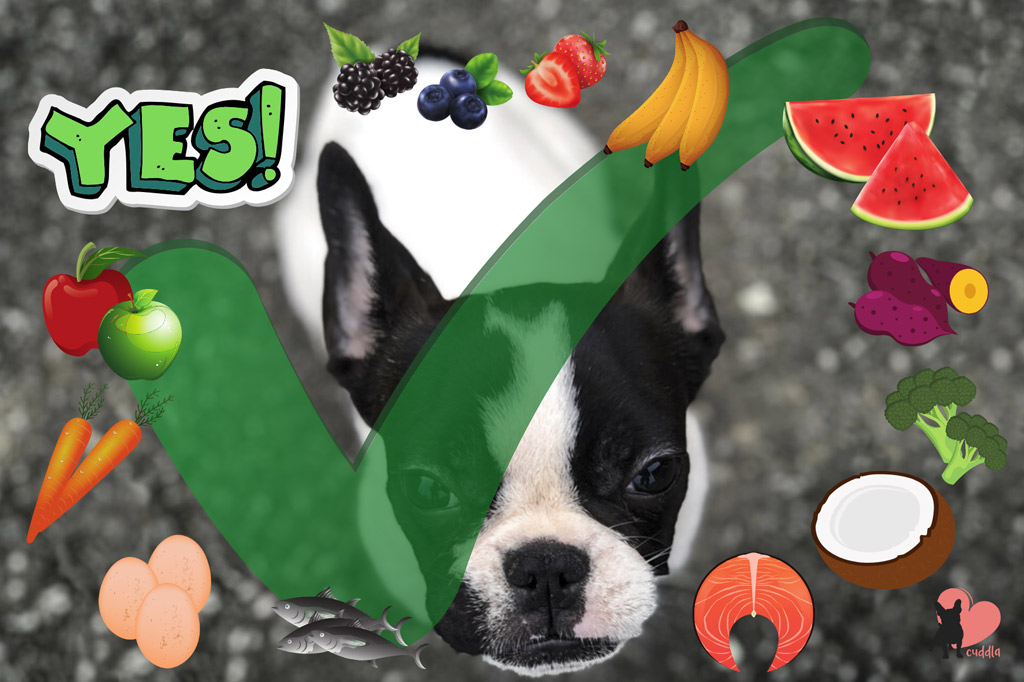
Safe Human Foods for Boston Terriers
Dogs can eat the following foods benefiting from their nutrients and healthy properties:
- Apples.
- Berries.
- Bananas.
- Watermelon.
- Carrots.
- Eggs.
- Sweet potatoes.
- Pumpkin seeds.
- Broccoli.
- Sardines.
- Salmon.
- Coconut Oil.
Find out why these foods are good for your Boston Terrier in Can a Boston Terrier Eat Apples? 10 Other Safe Human Foods blog post.
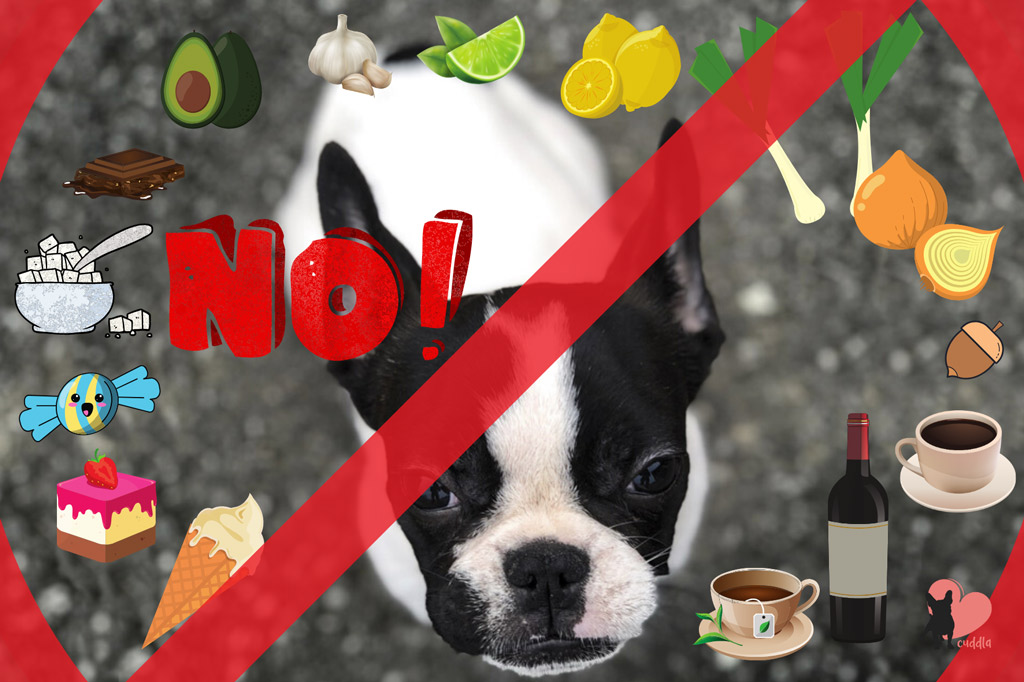
Toxic Human Foods for Boston Terriers
Dogs and humans metabolize foods differently. That’s why some foods that are safe for us can be toxic to dogs.
- Chocolate.
- Sugar.
- Xylitol.
- Onions.
- Garlic.
- Leeks.
- Chives.
- Avocado.
- Macadamia nuts.
- Lemons.
- Limes.
- Alcohol.
- Coffee.
- Tea.
- Nutmeg.
- Etc.
See full list in Can a Boston Terrier Eat Grapes? And 10 Other Toxic Foods.

My Boston is licking a lot. Mainly her feet, but also like to lick fake suede . I am wanting to start making her food, but I am so worried that I won’t get enough of this or that. Do you have a recipe for homemade cooked food? I really want to do what is best for her.
Hello Karmna, thanks for your comment! If she’s licking her paws, you want to make sure that she’s got no parasites. She could be itchy, have dry skin or something else – consider taking her to the vet if it doesn’t stop. Also, for more info about licking behaviour at https://cuddla.com/blog/why-do-boston-terriers-lick-so-much/ blog post.
In terms of recipes, I don’t have a homemade cooked recipe but I did a quick search on google typing “homemade cooked food recipes for dogs” and you have a lot of choices, depending on what ingredients you want to use.
Finally, if you are unsure of how much to feed your dog, you can check https://cuddla.com/blog/boston-terriers-raw-diet/ – where I share meal calories and quantity.
Let me know if I can help you with anything else and best of luck with your furry friend!